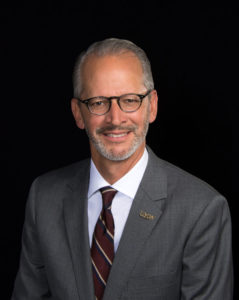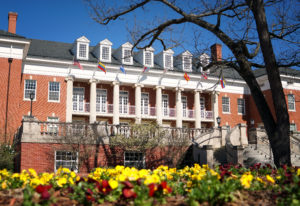University of Mary Washington President Troy Paino kicked off the fall semester – and the 2022-23 academic year – Tuesday morning during an in-person address to faculty and staff.

“I haven’t been able to welcome you like this for a while,” Paino said from the stage in George Washington Hall’s Dodd Auditorium.
The start-of-the-semester assembly came after what Paino called a busy summer and a very successful legislative session in which the commonwealth made a historic investment in UMW. The president spoke of plans for the funding, the launch of a new strategic vision slated to be revealed this fall, the filling of key administrative roles and – most importantly – the importance of welcoming a strong and diverse incoming class.
As the University enters its fourth year of steady tuition for in-state undergraduate students, Paino listed coming capital improvements, including renovation of Mary Washington’s performing arts complex and construction of a new theater meant to boost connections with the Fredericksburg community. Funds also will go toward making buildings across campus accessible and to supporting UMW Museums and the Office of Disability Resources, which accommodates Mary Washington’s significant percentage of students with registered disabilities.
He highlighted a host of senior staff, including Tim O’Donnell who, after months as interim provost, will officially serve as the University’s chief academic officer. Other UMW offices – including Admissions; Advancement; the Center for Community Engagement; Communications; Diversity, Equity and Inclusion; Emergency Management; Residence Life and Housing; Student Affairs; and Title IX – have also filled leadership roles.
Reflecting on an activity-packed summer, Paino praised what was deemed the “Mother of All Reunions,” which welcomed more than 1,300 alumni, including those whose celebrations had been delayed due to the pandemic, back to their alma mater. And he spoke of the weekend’s conclusion, the emotional renaming of the structure that serves as the main campus hub for student life as the Cedric Rucker University Center, in honor of the longtime dean who recently retired to join the Peace Corps.
Paino touted UMW’s Summer Enrichment Program, a residential experience introducing high-schoolers to college life. And he lauded a successful Orientation for incoming students that brought new members of the University community – and lots of energy – to campus.
“As we head into the fall, we have some things to look forward to,” Paino said.

New UMW flags throughout downtown Fredericksburg welcome students to the region, and ASPIRE banners are back by student demand, showcasing University-wide standards of accountability, scholarship, personal and institutional integrity, inclusive excellence, respect and civility, and engagement.
“Student leaders this year are going to be doing a lot around those community values … and how they guide a lot of our decision-making and the way we interact with one another.”
A new phase of the COVID-19 pandemic, Paino said, will point UMW away from institutional mandates, toward guidelines that appeal to individual responsibility.
A move to a new Carnegie Classification, affirming Mary Washington’s mission in the public liberal arts and sciences, will better reflect the University’s standing among baccalaureate institutions of higher education. And the initial phases of a website redesign, focused on prospective students and their families, are expected to launch early in the semester.
Efforts are underway on a new Quality Enhancement Plan on the way to reaffirming SACSCOC (Southern Association of Colleges and Schools Commission on Colleges) accreditation. And a Climate Action Task Force, formed last spring, will take aim at creating a plan to reduce the University’s carbon footprint.
Also new are UMW’s Talley Center for Psychological Services’ offering of extended hours for clinical counseling to help identify and assist distressed individuals.
Paino wrapped up his talk by painting a picture of current trends in higher education, demographic shifts and the underlying value of a degree.
“One thing that’s within our control is to think deeply about the work we do …” he said. In addition to preparing students for successful careers, “We should not lose sight of the most important thing we do as a public liberal arts university. We are trying to challenge our students to think about the choices they make, to think deeply about those choices, about what they are going to invest in and about what is worth investing in … I’m proud to be a part of a place like that.”